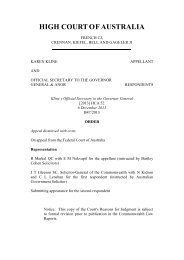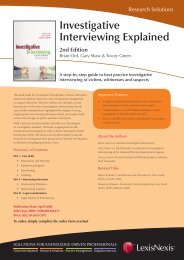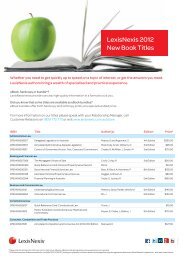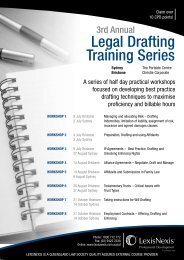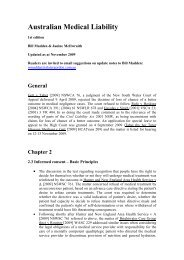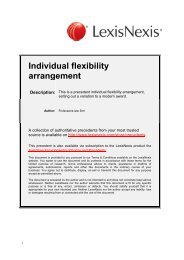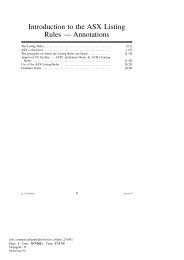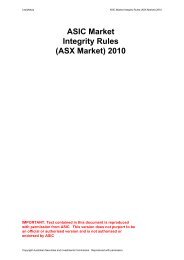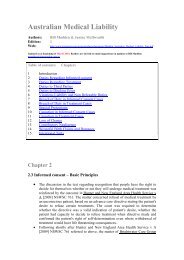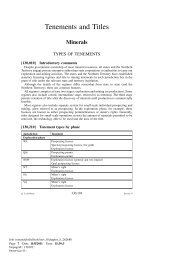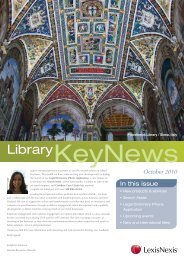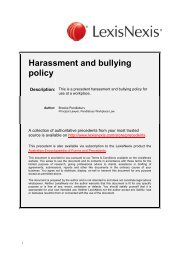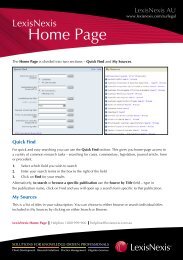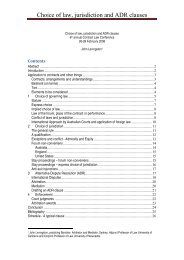Torts: Cases and Commentary - LexisNexis
Torts: Cases and Commentary - LexisNexis
Torts: Cases and Commentary - LexisNexis
You also want an ePaper? Increase the reach of your titles
YUMPU automatically turns print PDFs into web optimized ePapers that Google loves.
5.19 Ethical framework<br />
<br />
<br />
For an interesting discussion on the possible clinical benefit to the patient<br />
of an early disclosure of an adverse event, see A Allan & D McKillop, The<br />
health implications of apologizing after an adverse event, International<br />
Journal for Quality in Health Care 5 February 2010.<br />
Similar ethical obligations are reflected in 6.3.4 <strong>and</strong> 6.3.5 of Good Medical<br />
Practice: A Code of Conduct for Doctors in Australia adopted by the<br />
Medical Board of Australia<br />
www.medicalboard.gov.au/documents/default.aspx?record=WD10%2F12<br />
77&dbid=AP&chksum=eNjZ0Z%2FajN7oxjvHX...<br />
<br />
The Council of Australian Governments (COAG), at its meeting of 26 March<br />
2008, signed an Intergovernmental Agreement on the health workforce.<br />
This agreement led to the creation of a single national registration <strong>and</strong><br />
accreditation system for ten health professions: medical practitioners;<br />
nurses <strong>and</strong> midwives; pharmacists; physiotherapists; psychologists;<br />
osteopaths; chiropractors; optometrists; podiatrists <strong>and</strong> dentists (including<br />
dental hygienists, dental prosthetists <strong>and</strong> dental therapists). The scheme<br />
commenced on 1 July 2010. Section 141 of the Health Practitioner<br />
Regulation National Law 2009 (Act B) requires a registered health<br />
practitioner who reasonably believes that another registered health<br />
practitioner has behaved in a way that constitutes notifiable conduct,<br />
report that conduct to the relevant National Agency. In addition, a<br />
registered health practitioner who reasonably believes that a student has<br />
an impairment that, in the course of the student undertaking clinical<br />
training, may place the public at substantial risk of harm must report that<br />
conduct to the relevant National Agency. As to the width of notifiable<br />
conduct, the Bill settled on the following definition (s 140):<br />
notifiable conduct, in relation to a registered health practitioner,<br />
means the practitioner has:<br />
(a) practised the practitioner‘s profession while intoxicated by<br />
alcohol or drugs: or<br />
(b) engaged in sexual misconduct in connection with the practice of<br />
the practitioner‘s profession; or<br />
(c) placed the public at risk of substantial harm in the practitioner‘s<br />
practice of the profession because the practitioner has an<br />
impairment; or<br />
(d) placed the public at risk of harm because the practitioner has<br />
practised the profession in a way that constitutes a significant<br />
departure from accepted professional st<strong>and</strong>ards.<br />
8



